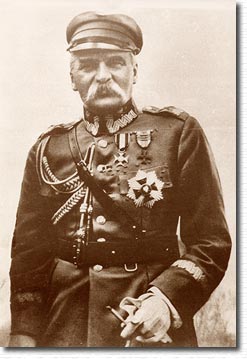
Józef Piłsudski, 1867-1935
Fall of central powers and tsarist’s Russia in 1918 allowed Poland to regain independence. With the Warsaw victory in 1920, this independence was secured. However, Polish politicians, after years of conspiracy or exile had to learn how to govern a nation. This proved to be difficult. March Constitution of 1921 has given almost all the power to the parliament, making president a mere figurehead with honorary functions.
Between 1918 and 1926, Poland experienced 14 governments. Although some of them had notable successes (like getting rid of hyperinflation by Prime Minister Wladyslaw Grabski), opinion about them was ruined by corruption scandals and inefficiency of “Parliamentocracy”. Dissidents centered around Józef Pilsudski, governor of State in 1918-1922, hero of war with Bolsheviks and first Marshal of Poland. In the may of 1926, Pilsudski organized coup d’etait and took power, forcing Wincenty Witos’ government and President Stanislaw Wojciechowski to resign. It was the beginning of movement called Sanacja (Latin Sanatio – to cure). Its aims included creation of strong, “healthful” state and moral revival of political class. Sanacja members represented vast spectrum of political views, but recruited mostly from the Legions- military forces leaded by Pilsudski during the Great War. They believed that people should be guided by national elite – i.e., by them.
Marshal Pilsudski governed with a heavy hand, tolerated no opposition, and did not hesitate to use drastic methods to curb defiant politicians (as exemplified by the bringing of police into the Sejm – lower house of Parliament - assembly hall in March 1928). Although Poland remained a democracy by name, with regularly held elections, but in fact she transferred into authoritarian semi-dictatorship, like most of other Eastern European countries in that period. This state of affairs was manifest especially in the 1930s, when Poland was affected by the crash on the New York stock market, and the ensuing economic crisis brought a tense atmosphere. In September 1930 Pilsudski disbanded Parliament and had many members of the opposition arrested, sentencing them to prison terms during unjust trial. In 1934 a camp was set up at Bereza Kartuska, where "individuals who posed a threat to security and order" were to be detained.
This all changed with the death of Józef Pilsudski in may of 1935. Sanacja was left without a leader and soon split up into different camps. Most important were President Ignacy Moscicki’s technocrats (“the Castle”) and group of general Edward Rydz-Smigly, who replaced Pilsudski as Chief Inspector of Armed Forces – moderate nationalists. Other groups, like “Sanacja’s leftist” and fascists-wannabe’s did not possessed significant power and ended up marginalized.
What we will see in future? Economy is recovering from the Great Crash, but Marian Zyndram-Koscialkowski’s government is unsuccessful and weakened by faction’s intrigues. The army is numerous, but after years of conservative Pilsudski’s rule technologically far behind great powers. How Rydz-Smigly will react? Will the strong ties that Poland has with France be enough to discourage aggressive leader of USSR and Germany? Are we going to see the next Great War?





